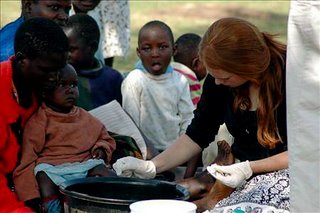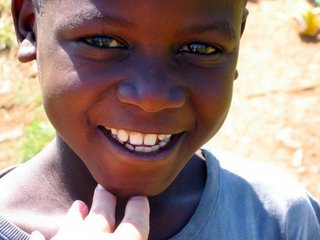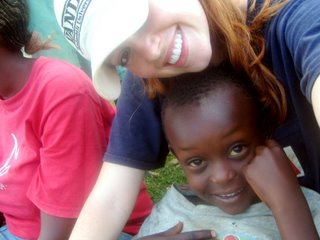Report on 2007 OACS Service Trip to Lwala Kenya
Aside from integrating ourselves culturally into Lwala (think fetching water in buckets from the well, walking miles every day, doing laundry outside by hand, living in mud huts, and eating things like chicken feet and fish eyes), we accomplished four main projects in the village: we facilitated the building of a protected spring, raised money for malaria-preventing bed nets to be sold (at a minimal price) in the clinic, started pen pal programs at the Lwala Primary School for sixth and seventh graders, and continued working with the Nyarego Women’s Group microfinance enterprise.
I was both moved and inspired by the students’ energy, drive and passion to complete our service projects. I’ve included descriptions of each service project, and some general advice for next year’s Lwala group. If you’d like to read more stories from our adventures, please go to www.lwaladiaries.blogspot.com.
Water Protection Project
Ben Murphy, a Vandy engineering student who graduated in May 2007, was the driving force behind this project.
Currently in Lwala there is no running water, which makes finding potable drinking sources very difficult. Villagers drink rainwater when available, and use dirty well or spring water for laundry, cooking and bathing. During the dry season, villagers must boil their water to drink, a time-consuming and lengthy process (when you not only have to build a fire, but you also have to chop the wood). Often times, both children and adults can be seen drinking out of non-potable springs and wells. Drinking of water contaminated by human or animal feces, which contains pathogenic microorganisms, causes water borne diseases, a serious health risk to the village.
Before arriving to Lwala, Ben fundraised and collected water-testing supplies, so we could test water sources for bacteria and microorganisms once in Lwala. Ben tested various springs and wells around Lwala, finding that most were contaminated.
We also collaborated with local leaders in the village to determine whether a protected spring would be beneficial to the community. A soko (“spring” in Dholuo) about five minutes from the Ochieng’ homestead was found to be perfect for such a project. In addition to discussing the project with the Village Chief and getting permission from the owner of the land where the spring was located, we asked community leaders their opinion of the project (which they wholeheartedly endorsed), and worked with a Ministry of Water consultant, who ultimately saw the project through.

before picture of the spring...

spring before we protected it

the stagnant water was a breeding ground for bacteria and pathogens.
The construction of the protected spring was a village effort. Women hauled rocks to the spring that would act as a sediment filter and men dug trenches and wheel-barrowed mud away from the site. The Vanderbilt group participated in the construction efforts as well, but the majority (if not all) the work should be credited to the men and women of Lwala.
On July 13th, we had the grand opening of the new spring. The water now constantly flows through two pipes into a concrete trench. The turbidity (amount of particles suspended in the water) is significantly decreased. The water appears clear and clean, whereas before the water was murky and at a standstill (it was a breeding ground for pathogens and bacteria). The workers built a barbed-wire fence around the spring to decrease the number of cattle in the area, which ultimately protects the spring from further contamination.

The group in front of the new spring.
On July 14th, a day after the spring was opened, we did our laundry in the newly clear water. We were not alone. Many, many people had already begun to use the new spring. It was great- each person who filled up a bucket of clear water looked at us and said a big, “erokomano,” which means “thank you” in dholuo. We hope that this new spring will bring clean, running water to Lwala for years to come.

opening day of the new spring

clear water!

new flowing, clean water
Malaria Bed Net Distribution
(Daniela Buscariollo, past president for Vanderbilt group “Students for Kenya” and current first year medical student at Vanderbilt, headed up this project).
Malaria is a serious problem in Lwala. In the clinic, it is the most common ailment with hundreds of patients diagnosed every week. If not treated, malaria can be fatal. Prevention of malaria is key, since the parasite is spread via mosquito bites. Using bed nets at night to protect against mosquito bites is a highly effective preventative measure, but because of limited availability and high cost, most families in Lwala do not own a bed net.
While in the US, Daniela fundraised for the project. Once in Lwala, we consulted Lwala Clinic Manager, Omondi Ochieng’ about the best way to distribute the bed nets. We hoped that this project would be self-sustainable, so that the clinic could continue to distribute bed nets in the future. Omondi suggested that we follow the government’s suggestions for dispensing bed nets to assure consistency and reliability when it came to pricing. The government sells bed nets for 50 Kenya shillings, the equivalent of about 75 cents. Omondi told us that this amount would be affordable for villagers. We donated the fundraised money to the clinic, specified that the money should go toward purchasing bed nets, and coordinated with the clinic nurse, Rose, and the clinical manager to begin selling nets as soon as possible.
Now, thanks to Vanderbilt’s efforts, the Lwala Clinic now has the funding and coordination to sell bed nets to patients at an affordable price.

Kat and Joy under a bed net
Pen Pal Program at Lwala Primary School
The Vanderbilt group did a lot of volunteering at the Lwala Primary School during our month in Kenya. Natalie taught 8th grade math, Kat taught English, and Dani and Ben taught science. Someone from the Vanderbilt group was working in the school every day, and we became good friends with both the Headmistress and teachers in the school.
Toward the end of our month-stay, we decided to continue the pen pal program that I started in summer 2006. Connecting students from the US and Lwala is a great way to promote education and understanding- plus, the kids love it and were so excited to receive their own pen pal.

seventh grade class that wrote pen pal letters
The Lwala kids happily wrote their letters, we took pictures of each class, and brought the letters back with us to the States. Both Daniela and I will give presentations at the schools in the US that will receive the letters. We’re looking forward to connecting kids from Denver and St. Louis to children in Lwala.

sixth graders writing their letters
Women’s Group Baskets
The Nyarego Women’s Group of Lwala, Kenya is a community-started group composed of about 30 women in a region of Kenya where HIV rates for women are 40%, and where women’s rights and education are often ignored.
All of the women in the Nyarego Group rely on subsistence farming for survival, which means that families only farm enough to eat: they don’t generate an income. The resulting poverty means it is very difficult for a family to send their children to school or to pay for healthcare.
In summer 2006, I spent time with the Nyarego Women’s Group in Lwala and noticed how beautifully crafted the women’s hand-made, colorful baskets were. Caitlin Reiner (another student in Lwala at the time) and I brought ten baskets back to the US to sell, and over $400 was generated for the Nyarego Women’s Group.

The Vanderbilt crew with the Nyarego Women's Group and the baskets.
With the money, the Women’s Group decided to construct a chicken house to raise and sell both chickens and eggs. This would generate a sustainable profit for the women of the group, empower the women to provide for their families, and increase the amount of protein in Lwala (which is important for malnourished individuals).
However, the chicken house is not yet finished. The women still need to build doors, finish painting, and purchase both chickens and chicken feed.
This year in Lwala, the females from the Vanderbilt team (Daniela, Natalie, Kat and I) met with the Women’s Group often. We danced and sang with the women (one of my favorite memories of Lwala), and figured out a way to sell more baskets so they can finish their chicken house. We discussed business with the women, and they decided to meet with an agricultural consultant who will advise them in their chicken house enterprise.
We brought back 30 baskets to sell in the US. All of the proceeds (we’re projecting around $1,200) will be sent to the women’s group account in Lwala. The hope is that eventually, we will connect the women with a buyer in the US (and find a way to ship the baskets from Kenya) so the selling of baskets will be less dependent on American students and more self-sustainable. If everything goes well with the chicken house, the selling of chickens and eggs should be self-sustainable within the year.

me with Yuca, the leader of the Women's Group.
Initial Suggestions for next year…
1. Limit group size to three undergraduates.
2. Any US bills brought into Kenya should be year 2000 or higher (they don’t accept earlier bills).
3. Participate actively in chores. We would wake up at 6:30 most mornings, do the dishes, clean the main house, fetch water for the day, etc. Helping out with the chores is an important and necessary part of living in Lwala.
4. Bring a wind-up flashlight.
5. Buy a converter and a transformer so you can charge camera batteries in the clinic!
6. Contact the Kenyan organization “I Choose Life,” an HIV/AIDS peer mentoring program, and bring them into Lwala. Participate in their activities and learn from them (they know what they’re doing!).
7. Definitely go on a safari at the end of the trip, but arrange payment beforehand.

Vanderbilt group in front of thousands of flamingos at Lake Nakuru
All in all, this trip was highly successful. The students gained invaluable international experience living and working in a rural, African village. We debated and discussed international development issues on a regular basis. We made friendships that will forever change us. We met the face of HIV/AIDS and were immersed in the social, cultural and health consequences of the disease. We were challenged to live without electricity, running water, a refrigerator and other daily conveniences we often take for granted in the US. We laughed and sang and danced and cried and played the African drums with villagers, and fell in love with several families. We walked 10 miles to use the internet once a week, took public transportation (which was often crowded and uncomfortable), and we built some serious arm muscles hoisting huge buckets of water on our head every day. I’m confident that our time in Lwala changed the way the Vanderbilt students view their world, and that they’ve been inspired to continue offering their talents, resources, energy and education to serve needy communities across the globe.
**A special thanks to Omondi, Fred, Grace, and Milton Ochieng’ for allowing us to live in your beautiful home. Also, Dr. Young, we thank you for your support and guidance during the trip and wonder, are you missing chapatti as much as we are?**







